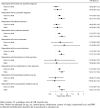Loneliness and the risk of type 2 diabetes
- PMID: 38479777
- PMCID: PMC11146379
- DOI: 10.1136/bmjdrc-2023-003934
Loneliness and the risk of type 2 diabetes
Abstract
Introduction: The incidence of type 2 diabetes is increasing globally. Recent research suggests that loneliness could be a potential risk factor for the development of type 2 diabetes. We aimed to investigate the association between loneliness and type 2 diabetes and the modifying effect of mental disorders.
Research design and methods: We conducted a prospective study including 465 290 adults (aged ≥16 years) who participated in either the Danish Health and Morbidity Survey or the Danish National Health Survey between 2000 and 2017. Loneliness was based on self-report, while type 2 diabetes was measured using an algorithm combining several health registers including type 2 diabetes patients treated both within the hospital sector and general practice. Cox proportional hazards regressions were used to estimate hazard ratios (HRs) and 95% confidence intervals (95% CIs).
Results: During a mean follow-up time of 6.3 years, 13 771 individuals (3%) developed type 2 diabetes. Feeling lonely once in a while was associated with a 14% increased risk of type 2 diabetes (95% CI 1.09 to 1.20), while feeling lonely often was associated with a 24% increased risk (95% CI 1.14 to 1.34), independent of sociodemographic factors and body mass index. The association was stronger among individuals without a mental disorder (HR 1.21, 95% CI 1.10 to 1.34 among those feeling lonely often) compared with those with a mental disorder (HR 1.07, 95% CI 0.93 to 1.23).
Conclusions: Loneliness independently increased the risk of type 2 diabetes. The effect was more pronounced in individuals without a mental disorder, as having a mental disorder itself likely increases the risk of type 2 diabetes. These findings emphasize the importance of addressing loneliness as a modifiable risk factor in preventing type 2 diabetes.
Keywords: Diabetes Mellitus, Type 2; Epidemiology; Mental Disorders.
© Author(s) (or their employer(s)) 2024. Re-use permitted under CC BY-NC. No commercial re-use. See rights and permissions. Published by BMJ.
Conflict of interest statement
Competing interests: None declared.
Figures



Similar articles
-
Loneliness increases the risk of type 2 diabetes: a 20 year follow-up - results from the HUNT study.Diabetologia. 2023 Jan;66(1):82-92. doi: 10.1007/s00125-022-05791-6. Epub 2022 Sep 28. Diabetologia. 2023. PMID: 36168066 Free PMC article.
-
Loneliness, health and mortality.Epidemiol Psychiatr Sci. 2019 Apr;28(2):234-239. doi: 10.1017/S2045796017000580. Epub 2017 Oct 30. Epidemiol Psychiatr Sci. 2019. PMID: 29081321 Free PMC article.
-
Loneliness and health in Eastern Europe: findings from Moscow, Russia.Public Health. 2015 Apr;129(4):403-10. doi: 10.1016/j.puhe.2014.12.021. Epub 2015 Mar 3. Public Health. 2015. PMID: 25744109
-
Prognostic factors for the development and progression of proliferative diabetic retinopathy in people with diabetic retinopathy.Cochrane Database Syst Rev. 2023 Feb 22;2(2):CD013775. doi: 10.1002/14651858.CD013775.pub2. Cochrane Database Syst Rev. 2023. PMID: 36815723 Free PMC article. Review.
-
Development of type 2 diabetes mellitus in people with intermediate hyperglycaemia.Cochrane Database Syst Rev. 2018 Oct 29;10(10):CD012661. doi: 10.1002/14651858.CD012661.pub2. Cochrane Database Syst Rev. 2018. PMID: 30371961 Free PMC article.
Cited by
-
The impact of social relationships on the risk of stroke and post-stroke mortality: a systematic review and meta-analysis.BMC Public Health. 2024 Sep 4;24(1):2403. doi: 10.1186/s12889-024-19835-6. BMC Public Health. 2024. PMID: 39232685 Free PMC article.
-
Association of diabetes mellitus and social isolation with loneliness among older Japanese adults: a cross-sectional study.Endocrine. 2025 Jul 11. doi: 10.1007/s12020-025-04348-y. Online ahead of print. Endocrine. 2025. PMID: 40640614
References
MeSH terms
LinkOut - more resources
Full Text Sources
Medical
